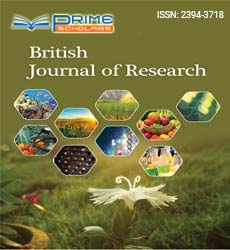Short Communication - (2023) Volume 10, Issue 11
Therapeutic Understudy Career Recognitions of Cardiac Surgery and Cardiology
Mark Christopher*
Department of Agriculture, University of the Philippines Los Banos, Philippines
*Correspondence:
Mark Christopher,
Department of Agriculture, University of the Philippines Los Banos,
Philippines,
Email:
Received: 01-Nov-2023, Manuscript No. IPBJR-23-18526;
Editor assigned: 03-Nov-2023, Pre QC No. IPBJR-23-18526 (PQ);
Reviewed: 17-Nov-2023, QC No. IPBJR-23-18526;
Revised: 22-Nov-2023, Manuscript No. IPBJR-23-18526 (R);
Published:
29-Nov-2023, DOI: 10.35841/2394-3718-10.11.103
Introduction
Cardiology is a branch of medicine that deals with the study
and treatment of disorders related to the heart and the circulatory
system. This vital field plays a crucial role in understanding
and managing various cardiovascular diseases, which remain
one of the leading causes of morbidity and mortality worldwide.
The heart, a remarkable organ, serves as the engine of
life, pumping blood throughout the body and supplying oxygen
and nutrients to every cell. Comprising four chambers-two atria
and two ventricles-the heart functions in a synchronized manner,
ensuring an uninterrupted flow of blood. The cardiovascular
system, consisting of the heart and blood vessels, works
tirelessly to maintain the body’s overall health and well-being.
Cardiology delves into the intricate world of cardiovascular
diseases, which encompass a range of conditions affecting the
heart and blood vessels. Some common cardiovascular diseases
include coronary artery disease, heart failure, arrhythmias,
and valvar heart diseases. These conditions often result from
a combination of genetic predisposition, lifestyle factors, and
environmental influences. Cardiologists employ a variety of diagnostic
tools and techniques to assess the health of the heart
and identify potential issues [1-3]. Electrocardiograms (ECGs or
EKGs) record the electrical activity of the heart, helping diagnose
irregularities in heart rhythm.
Description
Echocardiography uses sound waves to create images of the
heart’s structure and function, aiding in the evaluation of
valves, chambers, and blood flow. Advanced imaging technologies
such as cardiac MRI and CT scans provide detailed
insights into cardiac anatomy, helping cardiologists pinpoint
abnormalities. Stress tests assess how the heart responds to
increased workload, providing valuable information about its
overall condition. Blood tests measuring cardiac biomarkers aid
in detecting signs of heart damage or stress. Cardiology offers
a range of treatment modalities tailored to the specific needs
of each patient. Lifestyle modifications, such as a healthy diet,
regular exercise, and smoking cessation, form the foundation
of cardiovascular health. Medications, including beta-blockers,
ACE inhibitors, and statins, help manage conditions like hypertension
and high cholesterol. Interventional cardiology involves
minimally invasive procedures, such as angioplasty and stent
placement, to treat conditions like coronary artery disease.
Cardiac surgery, on the other hand, may be necessary for more
complex cases, including heart valve repair or replacement,
coronary artery bypass grafting, and heart transplant. Preventive
cardiology emphasizes proactive measures to reduce the
risk of developing cardiovascular diseases [4,5]. This approach
involves early detection and management of risk factors, such
as hypertension, diabetes, and obesity.
Conclusion
Educating individuals about the importance of a heart-healthy
lifestyle and regular check-ups plays a pivotal role in preventing
the onset of cardiovascular diseases. The field of cardiology is
dynamic, with ongoing research and technological advancements
driving innovation. Tele cardiology allows remote monitoring
of patients, facilitating timely interventions. Artificial
intelligence and machine learning are being integrated into diagnostic
processes, enhancing accuracy and efficiency. Emerging
therapies, such as gene editing and regenerative medicine,
hold promise for the future of cardiovascular care. Cardiology
stands at the forefront of healthcare, unraveling the complexities
of the heart and offering solutions to mitigate the impact
of cardiovascular diseases. With a holistic approach that spans
prevention, diagnosis, and treatment, cardiology plays a vital
role in enhancing the quality and longevity of life.
Acknowledgement
None.
Conflict Of Interest
The author’s declared that they have no conflict of interest.
References
- Kadiyala S, Harris J, Headey D (2014) Agriculture and nutrition in India: Mapping evidence to pathways. Ann NY Acad Sci. 1331:43-56.
[Crossref] [Google Scholar]
- Kumar N, Harris J, Rawat R (2015) If they grow it, will they eat it and grow? Evidence from Zambia on agricultural diversity and child undernutrition. J Dev Stud. 51:1060-1077.
[Crossref] [Google Scholar]
- Asghar U, Malik MF, Javed A (2016) Pesticide exposure and human health: A review. J Ecosyst Ecograph. 5:1-4.
[Crossref] [Google Scholar]
- Paparella S, Araujo SS, Rossi G, Wijayasinghe M, Carbonera D, et al. (2015) Seed priming: State of the art and new perspectives. Plant Cell Rep. 34(8):1281-1293.
[Crossref] [Google Scholar]
- Hudrlik, Paul F, Wan, Chung-Nan (1975) Reactions of oxetane with imine salts derived from cyclohexanone. The J of Orga Chem. 40 (20): 2963-2965.
[Crossref] [Google Scholar]
Citation: Christopher M (2023) Therapeutic Understudy Career Recognitions of Cardiac Surgery and Cardiology. Br J Res. 10:103.
Copyright: © 2023 Christopher M. This is an open-access article distributed under the terms of the Creative Commons Attribution License, which permits unrestricted use, distribution, and reproduction in any medium, provided the original author and source are credited.

